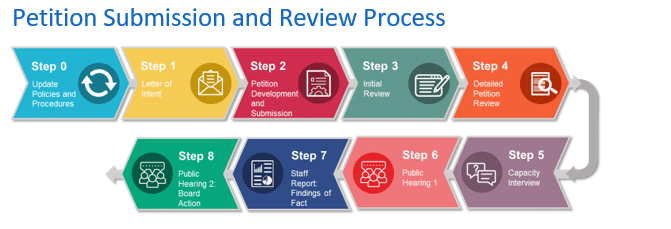CA2.0 Update: Coming This Month! First Authorizer Toolkits!
The first two CCAP authorizer Toolkits, aimed at promoting top quality charter authorization, will be released this month! These toolkits cover evaluating charter petitions, with a strong focus on how the charter school will address the unique needs of English learners, and using the annual report process, including school site visits, to assess charter school performance. Each segment of the Toolkits identifies the corresponding section of the California Education Code on which it is based.
Petition Toolkit
The Petition Toolkit contains five sections: an introduction, an overview of the petition submission and review process, a petition template, a petition evaluation rubric, and a findings of fact document. Each section builds on the previous one to create a thorough review that is also user-friendly. For example, the overview document has a step-by-step guide and suggested timeline.
The evaluation rubric contains an initial petition review checklist that each petitioner should complete. The petition template section discusses each element that must be included, suggested components based on best and promising practices, and formatting requirements.
The findings of fact section is where authorizers can recommend approval or denial of a petition and document their reasons.
Annual Report Toolkit
Reporting annually on the performance of charter schools is an essential practice for effective oversight of charter schools. They help track whether a school is doing a good job of educating its students so that the school and its authorizer are on the same page during the term of the charter. Annual reports do not replace authorizers’ formal process for considering a charter school renewal application; however, they do indicate whether a school is meeting its expectations, and they identify areas where a school needs to improve before seeking renewal.
The annual report toolkit contains five sections: an introduction, an academic performance framework, operations and governance framework, financial health and sustainability framework, site visit protocol, and a template for the annual report. Each section is focused on one of the Core Charter Performance Questions that guide authorizers in all of their responsibilities.
The focus of the academic performance framework is the core question: Is the charter school’s education program a success? It identifies data sources and measures that can be used to assess achievement levels for every subgroup of students in English language arts, mathematics, and college and career readiness, as well as the progress of English language learners.
The operations and governance framework is designed to answer the core question: Is the charter school operating and governed effectively? This framework evaluates compliance with processes and requirements based on the minimum legal and ethical standards for California charter schools.
The financial health and sustainability framework focuses on the core question: Is the charter school financially viable?
And the annual performance report section also seeks to answer the question: Is the charter school advancing equity and access through serving public policy purposes?
A section on site visit protocol describes different types of visits, when they should take place, and what authorizers should look for in each type of visit. For example, the initial visit should take place in the fall or early winter of the school’s first year in operation to ensure that the school opened successfully and to identify any challenges.
The toolkits include a help tab for authorizers to ask questions or provide feedback.
When they are posted, you will be able to access the Toolkits on CCAP’s website, www.calauthorizers.org, by clicking on “Initiatives” and “CA2.0.”

